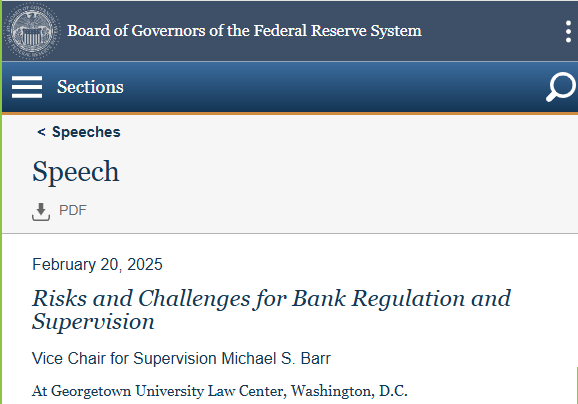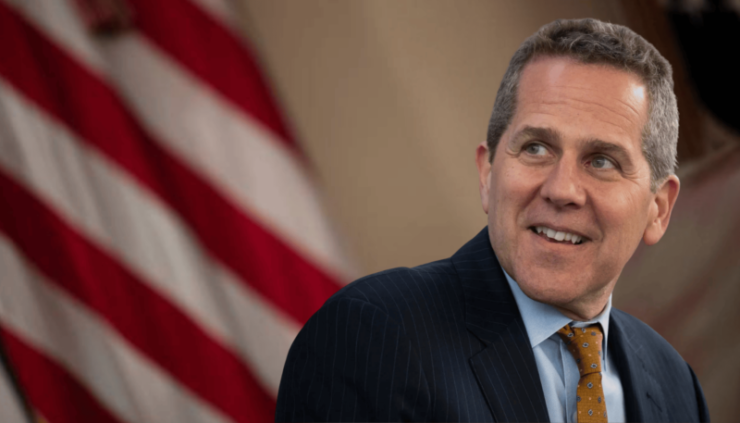In one of his final public appearances as the Federal Reserve’s Vice Chair for Supervision, Michael Barr took the opportunity to clarify the Federal Reserve’s stance on banks engaging with cryptocurrency businesses, a topic that has sparked debate amid increasing regulatory scrutiny. This came In a recent address at the Council on Foreign Relations, where Barr refuted claims that the central bank is systematically excluding cryptocurrency businesses from banking services.

When asked about the pressures financial institutions face in managing relationships with crypto firms, Barr emphasized the Fed’s commitment to maintaining neutrality:
“You know, we try very much at the Fed to kind of play straight up the middle on these issues. So, we have institutions and banks of all sizes supervised by the Fed that are engaged in crypto-related activities, either themselves directly or supporting clients who do crypto work. Our expectation is they do that in a safe and sound way.”
Barr was explicit in outlining the expectations for banks interested in engaging with the crypto industry. He made it clear that the Federal Reserve does not actively dissuade banks from working with crypto-related businesses but stressed the importance of adhering to stringent regulatory requirements. These include compliance with anti-money laundering (AML) laws, consumer protection mandates, and robust liquidity management practices.
He further elaborated on the Fed’s dedicated supervision program for banks involved in digital assets, noting that while some institutions have successfully navigated the complexities of the crypto space, others have faltered due to liquidity challenges and compliance lapses.
Industry Concerns and Regulatory Scrutiny
The crypto industry has voiced apprehensions over what it perceives as a coordinated effort by regulatory bodies to sever ties between banks and cryptocurrency businesses. These concerns have been amplified by reports of numerous crypto hedge funds and startups facing difficulties in securing basic banking services, leading to debates over the existence of an unofficial initiative dubbed “Operation Chokepoint 2.0.” This alleged operation suggests a clandestine campaign to marginalize certain industries, including crypto, by pressuring banks to withdraw services.
The discourse surrounding “debanking” extends beyond the crypto industry, touching on broader issues of financial inclusion and the role of regulatory agencies in influencing banking practices. While regulators emphasize the necessity of risk management and adherence to anti-money laundering laws, critics argue that overly stringent measures could stifle innovation and limit access to financial services for emerging sectors.
Michael Barr’s Exit Ahead of Potential Conflict with Trump Administration
Michael Barr announced his decision to step down from his supervisory role effective February 28—over a year before his term was originally set to expire in July 2026. The announcement, made last month, has been interpreted as a preemptive effort to avoid what could have become a contentious legal battle with the incoming Trump administration, which is now free to appoint its own candidate for the powerful regulatory position.
While stepping down from his role as Vice Chair for Supervision, Barr will retain his seat on the Fed’s Board of Governors, where his term will continue until 2032. This strategic decision allows Barr to maintain influence at the central bank while relinquishing the more politically sensitive supervision role.
Initially, Barr had expressed his intent to complete his full term. During testimony to Congress in November, he made it clear that he planned to serve until 2026. However, growing tensions between the Fed and the incoming Trump administration led Barr to reconsider. Reports from the Washington Post in October revealed that the Trump team was exploring options to demote Barr from his regulatory post, potentially igniting a messy power struggle.
Quick Facts:
- Fed Vice Chair for Supervision, Michael Barr refuted claims that the central bank is systematically excluding cryptocurrency businesses from banking services.
- According to Barr, the Federal Reserve does not actively dissuade banks from working with crypto-related businesses
- Michael Barr has announced his decision to step down from his supervisory role effective February 28—over a year before his term was originally set to expire





